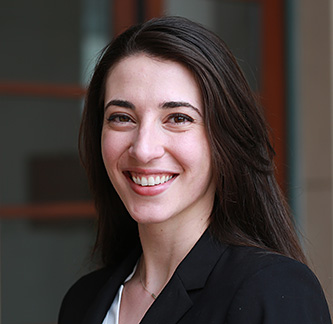University of Virginia School of Law students are helping the Pentagon tackle emerging national security challenges in a new UVA multidisciplinary course.
Students taking the new class Innovation in the Public Interest, co-taught by UVA Law professor Thomas Nachbar, work on real problems facing the U.S. Department of Defense — from understanding the implications of using artificial intelligence in making military decisions to implementing “norms of behavior” in outer space.
The students will present their work for consideration by the Pentagon.
A multidisciplinary team of faculty was awarded a national grant to establish the course, aimed at teaching graduate students to examine the complex technological, legal and policy implications of real-world problems faced by various agencies within Defense Department.
Nachbar is a national security law expert, judge advocate in the U.S. Army Reserve and a senior fellow at the Center for National Security Law. He co-teaches the class with computer science professor Jack Davidson, and politics and public policy professor Philip Potter.
A goal of the course is to teach law students how to work with people from other disciplines in a practical problem-solving environment, Nachbar said.
“There are law students, policy students and engineering students on each one of the teams,” he said. “When you think of lawyers in their offices, the stereotype is that they’re not doing project-based problem-solving. They’re thinking great legal thoughts and writing briefs. But that’s not accurate. Lawyers work with others all the time to solve problems, and more often than not they’re doing it in teams with technical and policy experts.”
Of the 34 students taking the class, 16 are law students.
Irina Danescu ’20 said she was drawn to the class because of her background in economics and public policy, and involvement with Law, Innovation, Security, and Technology, a UVA Law student organization. She was a full-term extern last semester at the U.S. Transportation Command Office of the Staff Judge Advocate at Scott Air Force Base and has interned at the U.S. Attorney’s Office for the Eastern District of Missouri. Before law school, she was a research assistant at the RAND Corp.

“The class has covered both relevant practical knowledge as well as problem-solving methodologies and frameworks, all of which will hopefully be of use in my legal career,” Danescu said.
Her team is examining unmanned aerial systems, such as drones. Students are addressing the fact that small drones have increasing applications for the Pentagon, including intelligence and surveillance, while also having many uses in commercial industries, including construction surveying, crop monitoring, filming and photography.
“The goal of our project is to understand how to develop a competitive small-drone design and manufacturing industry in the U.S. and allied countries,” she said. “We are assessing U.S. regulation, technological gaps, the role of state subsidies or tax incentives, and the specifics of the supply chain concerns.”
Danescu will be an associate with Covington & Burling in Washington, D.C., this fall and eyes joining the privacy and cybersecurity practice. She’s excited by the prospect of working in the national security and technology field.
UVA is the only Virginia university that is a founding partner of the Public Interest Technology University Network, run through the Office of the Provost. The University received a $90,000 grant — one of 27 grants awarded across the country — from think tank New America as a way to cultivate academic initiatives that prepare the next generation to design, build and govern new technologies that advance the public interest.
Not every problem will have a technological solution, Davidson said. He noted that the challenges are going to require careful thought about how policy and law intersect. For example, the office of the deputy assistant secretary of defense for space policy sought recommendations for “international norms in space” in order to enhance spaceflight safety and space stability.
“Now, everybody’s in space,” Davidson said. “It used to be us and the Russians. And so, OK, we tried to figure out how to get along with them. But there are not really any great policies similar to what we have in maritime policies at sea, and how nations act and treat one another. So it’s pretty fascinating. I’m enthralled with some of the discussions they have because it’s just really thorny issues.
Nachbar has, among other assignments as a judge advocate in the Reserve, edited an Army handbook on the development of legal systems, trained Palestinian security forces in the West Bank and deployed to Iraq. He also teaches and writes on cybersecurity, with an emphasis on security of communication networks and the connection between network security and private industry. His current work also explores the relationship between public and private regulation.
Davidson is a cybersecurity researcher at UVA’s School of Engineering who also leads the University’s Cyber Innovation and Society Institute. Potter is director of the National Security Policy Center.
Nachbar said he hopes the course is available in the future and that law students will come away with skills that help them work with non-lawyers in the field.
“What I’m really hoping they get from the course is that when they’re talking to somebody who’s working for their client, they’re not only talking to a person, they’re talking to a set of interests,” he said. “Understanding where those interests sit within the organization’s larger interests — whether it’s a firm or the government — gives them a huge amount of context in understanding those conversations.”
Audra Book contributed to this article.
Founded in 1819, the University of Virginia School of Law is the second-oldest continuously operating law school in the nation. Consistently ranked among the top law schools, Virginia is a world-renowned training ground for distinguished lawyers and public servants, instilling in them a commitment to leadership, integrity and community service.


